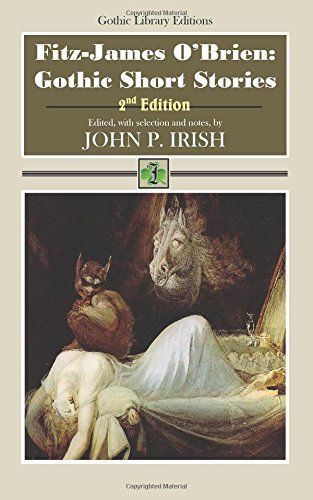
Fitz-James O'Brien Gothic Short Stories
A tremendous number of European immigrants came to the United States during the 1840s and 1850s; many came in search of new economic opportunities. Fitz-James O'Brien (1828-1862) came to America (originally from Ireland) in 1852 looking to make his way in the literary world. With impressive recommendations in hand, he had no trouble finding work and immediately started editing and publishing stories in some of the most influential magazines of the day (e.g., Harper's New Monthly Magazine, The American Whig Review, Putnam's Monthly Magazine, and The Knickerbocker, or New-York Monthly Magazine). When the Civil War broke out, in 1861, he joined the Union army and was fatally wounded in 1862. O'Brien is one of the most important American writers in between the first and the second half of the nineteenth-century. He serves as an important literary bridge between Romanticism and Realism. His short stories follow the same natural and supernatural horror, philosophical observations of human nature, and social criticisms as those of the great American triumvirate - Irving, Hawthorne, and Poe. It was Poe that had a particularly strong influence on his writing, but the influence of all three of these writers can be seen in his stories. H.P. Lovecraft said of O'Brien, in his important survey of supernatural literature, Supernatural Horror in Literature, "O'Brien's early death undoubtedly deprived us of some masterful tales of strangeness and terror." This collection will be the most complete one-volume edition of O'Brien's works to date. Included in this edition are all his important stories, the ones that he was most known for during his lifetime (e.g., "What Was It?" "The Diamond Lens," and "The Wondersmith"), as well as others that have never been published since their initial publication in the 1850s. This edition comprises about half his total published short stories during his lifetime. Most O'Brien anthologies contain five to eight of his stories, this edition contains over thirty-five short stories, as well as a sampling of his Gothic poetry. All aspects of O'Brien's Gothic will be represented in this edition, the supernatural, urban, fantasy, and tragedy. Also included in this edition are some of his satires and the semi-autobiographical and humorous story "Carrying Weight." This volume will be of interest for courses on American Studies as well as courses focusing on Romantic and Gothic Literature, Horror, Science Fiction, or the Humanities.